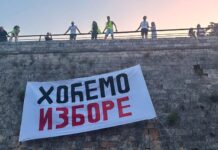WITH ALBANIAN ACTIVISTS TOWARDS LONG-TERM CHANGE
“The power of the youth is the common wealth for the entire world. The faces of young people are the faces of our past, our present and our future. No segment of society can match the power, idealism, enthusiasm and courage of the young people.” – Kailash Satyarthi
by Arjeta Murati
Kosovo, a country with the youngest population in Europe, side by side with endless injustice and insistence on its rights, is known as an unstoppable activist state.
Revolutionary acts in Kosovo began back in the early times. One example dates back to 1981 when a student in the cafeteria of the University of Pristina broke a plate in protest of long-term harassment. This act was not met with approval, the same as many other activist actions are still not recognized by the country’s top officials.
Activism as a voluntary initiative of individuals for change and reform of rules unacceptable to a large part of the population must be treated with passion and motivation. As such, it’s essential purpose is to help people and groups in sensitive situations, which is more than just social work, as it affects change in people’s lives and in the environment in which we grow, live and function.
Kosovo’s history objectively demonstrates that the actions taken by young people in their social struggles have led to transformations promoted at every specific historical moment in order to achieve goals in the public interest. In this regard, education is a favorable tool.
The greatest revolutionary acts of young people are taken against political demands for reality to be “swept under the carpet”.
From this point of view, Kosovo’s young people strive to maintain the certainty of the power of education and believe that it is required in order to lead people towards the achievement of the highest goals. The social function of education, its content and its essence have changed over the last decades, determined by material circumstances and social relations. Therefore, young people initiate developmental projects for the betterment of society, at the core of which is the education of its members.
For two consecutive years (2019-2020), youth leaders from Kosovo have been using and analyzing the institutional methods available for resolving problems in reports, campaigns and various forms of meetings through which the incompetence of professors with illicitly obtained degrees, posing as educators, is revealed and reported. Following those efforts, protests were organized as a symbolic action, and after seven months it resulted in three people being forced to leave their workplace.
On this subject, an exhibition was held at “Zahir Pajaziti” Square in Pristina titled “Plagiarism of the Minister of Education”, who was involved in the biggest plagiarism and fraud scandal. In addition, marches against the poor quality of education were held in which students from 29 municipalities of Kosovo participated under the slogan “Do not go to school”, at which the lack of security in schools and violence against students were highlighted. In frequent protests, students show that the poor quality of education forces them to leave the country. According to media reports, high school students exhibited great dissatisfaction with the quality of education, but also showed a great desire and willingness to influence the improvement of reforms being implemented in the education system.
On International Youth Day, a protest was held in the capital square that was filled with suitcases. Through tears and pain, people told their stories, how they were forced to leave Kosovo in search of a better future. Although most are unaware or willing to confront the violations of their rights, it is clear that young people are prone to change, and their spirit and motives are manifested through various acts, whether peaceful or artistic.
The student feminist movement is another good example. It is a platform that encourages student criticism from a feminist perspective, and which was created on the principles of gender equality and social justice. It is based on the conviction that the University should be accessible to all and serve the interests of the public, and its purpose is to work on the well-being of students through feminist criticism.
Loud and opposed to turbulent processes are also the following examples: the protest against the Russian-Ukrainian conflict; protests against rape, persecution, threats, abuse and murder of women; frequent protests against the neglect and refusal to improve human rights processes under the slogans “Homophobes have no place in Parliament” and annual pride parades; various calls for the boycott of products from neighboring countries for the normalization of bilateral relations; state-level protests against the health care system; various initiatives against discrimination and terrorism, etc…
At times awareness significantly rises, but in addition to awareness, there is also an obvious lack of political culture. The system is complex, so human activism is based on necessity, objective grounds that propel human action, where interest, purpose, means and conditions are integrated.
What would Kosovo be like if young people had a greater role in decision-making?
Young people can change Kosovo, because they are aware of the problems affecting them. Together, we need to be aware of the laws that necessitate our participation in the decision-making process, such as: public health, employment, education, social issues, civic and democratic education, environment, spatial planning and rural development and culture, sports and recreation. In other words, Law No. 03/L-145 for the empowerment and participation of the youth https://gzk.rks-gov.net/ActDocumentDetail.aspx?ActID=2654.
Some of the factors that would increase the participation of young people in decision-making are: support from youth organizations; engaging more young people in public institutions as trainees or in similar forms; discussions with young people about local politics. Here, participation in decision-making would obviously contribute to the fulfillment of their potential in the country in which they live; the development of better policies for young people; greater participation of young people in public life; the creation of more inclusive communities.
There’s a famous saying, “What they teach you in school doesn’t prepare you for life.” In principle, this seems absurd, because we go to school to learn what we do not know. However, in reality the essence of this saying is very true. Whoever pursues extracurricular activities of any nature, especially the young, comes to realize that they are an excellent supplement to classes. What is lacking in schools is the promotion of social development through extracurricular activities.
The only way to overcome the challenges in the country is to face the problems directly. Most often in life we learn lessons from previous struggles. So, let’s be fearless, brave, enthusiastic, dynamic and confident. Let’s express our ideas, potential, creativity, faith and great energy so as to create a better place for all of us. Within the framework of voluntary activism, we fight against the present negative phenomena in society and learn how to address the problems that surround us.
And finally, after all that has been said and done, it is up to us to decide whether we want our actions to be the face of change and an inspiration for others. Ours is to create a world we want to live in. It’s up to us to show that we are the change, and that we’re somebody. You and me.














